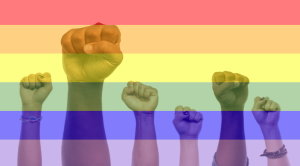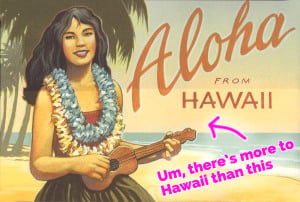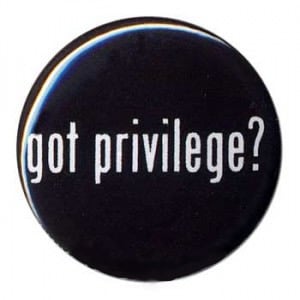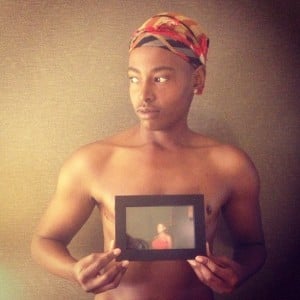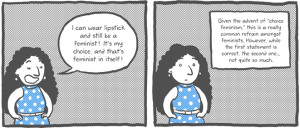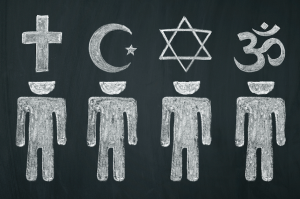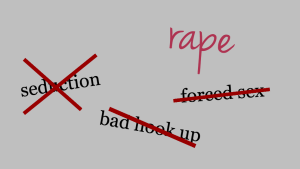
Source: Gallery Hip
“Anything you can do I can do better!”
That’s the refrain from a duet in the musical Annie Get Your Gun, in which Annie Oakley and Frank Butler try to one up each other before they head to a sharpshooting contest.
The duet is about a woman trying to prove that she can best a man, which is why it reminds me of the problematic belief in feminist movements that women should want to do anything that men do.
Don’t get me wrong: Women can definitely do what men can – and should be allowed to. We should be able to vote and be paid equal wages in the workplace, for example.
But sometimes, we shouldn’t want to do exactly what men do. That’s because some of the things men do are harmful to other people, especially to women.
One good example is when misogyny shows up amongst queer women. Misogyny shouldn’t be something we want to emulate, nor is it something that becomes empowering just because marginalized people practice it.
Of course, countless people would agree that misogyny is bad and that nobody should be emulating it. But here’s another example: the hype around Hillary Clinton running for president.
It might seem amazing that a woman could hold the highest political position in the US, but who is it truly empowering if she pursues policies that harm people of color and other marginalized groups around the world, as previous presidents have done?
That’s why simply being able to do what men do shouldn’t be the end goal of feminism.
It’s not empowering if we demand a seat at the table without asking who built the table, what’s being served, and if that seat is actually worth it.
Instead, it’s time that we begin questioning whether there can be better tables to sit at.
Empowerment in the Media
One of the places where I see the “Anything you can do I can do better” mentality practiced most often is among fans of books, movies, TV shows, and other mainstream media.
I’ll be the first person to tell you that fictional narratives hold great power.
What might not be possible in the real world can be achieved with the writer’s imagination and a couple of keystrokes.
That’s why there are many fictional women who are celebrated as feminist. All it takes is a couple of words on the page, and women can be leaders, pioneers, and heroes, just like male characters.
But there are some characters that are celebrated just because they do the same things that male characters would do — even if those things harm other people.
That’s why it’s important to always ask at what cost empowerment comes. Is it worth it for women to be able to do the same things as men, if doing so means that they harm others?
In order to examine this further, I’ll discuss a character that fans often hail as empowered: Danaerys Targaryen from Game of Thrones.
A Game of White Saviors
I’ll admit: I was a big fan of Danaerys Targaryen at the start of Game of Thrones.
We first meet Danaerys when her brother sells her into marriage in order to further his plans to reclaim their family’s throne.
Over the course of the story though, Danaerys becomes the leader of her husband’s people, and sets out on her own journey to reclaim the throne.
However, I’ve come to realize that Danaerys is a white savior.
In fictional narratives, a white savior is a white person who gains the trust of a community of people of color.
This white person then proceeds to save the people of color and becomes, in the words of Annalee Newitz, “its most awesome member.”
Think about movies like Avatar, The Last Samurai, Dances with Wolves, To Kill a Mockingbird and—well—you can take a look at the list yourself. Those are all white savior movies.
White saviors can be women or men. However, white women are usually only white saviors in movies about the school system or social services.
When it comes to narratives which are more epic in scale (like saving an entire race of people from colonizing forces), the white savior is almost always a man.
It’s probably because in narratives like those, the white savior is supposed to be someone who’s strong, brave, and a natural-born leader: traits which we almost exclusively associate with men.
Even though she’s a woman, Danaerys Targaryen possesses all of those traits. She’s a savvy and daring leader, and she manages to convince entire armies to follow her.
It was inspiring to have a woman like her in fantasy fiction, which is so often dominated by male characters.
But then came the arc about her freeing slaves.
For those who aren’t familiar with Game of Thrones, Danaerys is a white woman, and the slaves she frees are people of color. They’re coded as people of color in the books, and it’s confirmed in HBO’s TV adaptation.
I’m sure that George R.R. Martin didn’t intend for Danaerys to be a white savior.
After all, Game of Thrones is often praised for its portrayal of complex and compelling women. But because race and gender intersect, Danaerys’ arc is only really empowering for white women.
In other words, just because Danaerys gets to occupy a position that white men have dominated in the past doesn’t mean that we should be celebrating.
As Teju Cole eloquently wrote, the white savior only frees people of color in order to feel good about themselves.
They don’t really care about the people of color — otherwise why present them as a nameless, faceless mass who are incapable of helping themselves, as Game of Thrones does with the slaves that Danaerys frees?
To be clear, there’s a difference between being an ally and a white savior.
An ally is there to listen to people of color, and to support them as they speak up about their experiences. An ally should never be in the spotlight.
A white savior, on the other hand, speaks for people of color because they assume that people of color aren’t brave or capable enough to do it themselves.
To a white savior, people of color are abject figures who need a white person to come and uplift them.
So when Danaerys Targaryen becomes a white savior, it might seem empowering to white women. But it’s the complete opposite for people of color, including women of color.
So if that’s not the kind of empowerment we’re looking for, then what is?
Redefining Strong
As I said earlier, rather than simply asking for a seat at the table, we should ask what that seat will cost. To draw this analogy out further, we should also ask if it’s possible for a better table to be built.
In the case of empowering women, we should ask what empowerment not based on men’s achievements looks like.
In other words, rather than only celebrating women doing what men have been doing, we should also celebrate what women are already doing but aren’t recognized for.
Let’s use Game of Thrones as an example again.
Sansa Stark is another character in the series, but unlike Danaerys, she isn’t quite as popular. In fact, she might just be the most hated character.
I could list the many purported reasons for this hate, but it all boils down to one thing: Sansa possesses traits which are often considered “feminine.” She’s emotional, sensitive, and believes in good manners.
Because Sansa doesn’t have stereotypically “masculine” traits (like physical bravery and leadership skills), people consider her weak.
It’s just another way of demonizing femininity, much like when we deride women who act cute or like makeup.
But Sansa is far from a weak character. Let’s put her story in perspective: she witnesses her father being executed, and suffers physical, verbal, and emotional abuse from her fiancé.
At the end of it all, though, she takes a chance and is able to escape.
I wouldn’t call any of that the signs of a weak character. Maybe I should say that I’m confused as to why people still think that about Sansa, but I’m not.
I know it’s because she doesn’t solve her problems by fighting back physically or by standing up for herself directly. Instead, she uses her “feminine” traits to her advantage.
She becomes adept at reading other people’s feelings, which helps her navigate the often murky waters of court politics. And she uses her good manners as a shield to hide her own intentions, so that she can appear the obedient fiancée and therefore survive.
But she’s never praised for any of these things, because none of these things are what we think of as heroic. Which begs the question: why shouldn’t they be?
***
It seems awfully limited to say that feminism should only be about proving that anything men can do, women can do, too.
It’s like saying that there’s only one table, and everyone has to try and cram themselves around it.
That’s kind of counter to our vision at Everyday Feminism. At EF, we want everyone to be treated with respect and compassion, regardless of their identity or how they present themselves.
Besides, it’s kind of obvious why only having one table is bad: there will inevitably be people who can’t find a seat at the table.
There’s also the problem of that cost I talked about earlier. Who will you have to trample in order to get that coveted seat at the table?
Instead of only demanding a seat at the table, we should consider building enough tables for everyone to sit at.
We should also make sure that there are a variety of tables, and that there are ways for people to get a seat which don’t involve trampling other people.
That sounds kind of abstract, so let’s pull back a little and put it in concrete terms of empowering women.
Rather than saying that there’s only one way for women to be empowered — i.e. by doing the same things men do — we should redefine strength to include things such as sensitivity, compassion, and gentleness.
Those are all things that we could use more of in this world. It’s about time we started celebrating women (and men) for having those traits, and letting them know that they’re worthy regardless of how they empower themselves.
[do_widget id=”text-101″]
Kerry Truong is a Contributing Writer for Everyday Feminism. They are a queer diasporic Vietnamese womxn and graduated this spring with a double degree in English and Asian American Studies. When they’re not philosophizing about this at length, they’re reading, taking long walks, or cooing over all the dogs who cross their path. Read their Everyday Feminism articles here.
Search our 3000+ articles!
Read our articles about:
Our online racial justice training
Used by hundreds of universities, non-profits, and businesses.
Click to learn more





